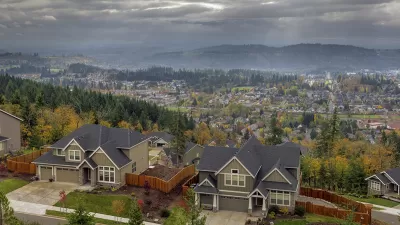Homeownership is declining in the United States, so what does the new homeowner of the post-recession era look like?

As the country has emerged from the Great Recession and the Millennial generation has come of age in a new kind of housing crisis, homeownership has declined and the whole idea of homeownership has taken on a new character.
Jenny Schuetz details the contemporary "face" of homeownership in the United States—i.e., "the demographic and economic characteristics of prospective homeowners."
Schuetz calls on household-level data from the most recent American Housing Survey (AHS 2015), using new homeowners as a proxy to compare to renters and long-time homeowners, as well as new homeowners in 2001 and 2015.
Click through to the article to see data on new homeowners as broken down by age, household size, race, wealth, education, and more, as well as the characteristics of the building stock new homeowners move into in 2015. Schuetz also packages all of the findings of this analysis in three policy implications that planners will want to note.
FULL STORY: Who is the new face of American homeownership?

Planetizen Federal Action Tracker
A weekly monitor of how Trump’s orders and actions are impacting planners and planning in America.

San Francisco's School District Spent $105M To Build Affordable Housing for Teachers — And That's Just the Beginning
SFUSD joins a growing list of school districts using their land holdings to address housing affordability challenges faced by their own employees.

The Tiny, Adorable $7,000 Car Turning Japan Onto EVs
The single seat Mibot charges from a regular plug as quickly as an iPad, and is about half the price of an average EV.

Seattle's Plan for Adopting Driverless Cars
Equity, safety, accessibility and affordability are front of mind as the city prepares for robotaxis and other autonomous vehicles.

As Trump Phases Out FEMA, Is It Time to Flee the Floodplains?
With less federal funding available for disaster relief efforts, the need to relocate at-risk communities is more urgent than ever.

With Protected Lanes, 460% More People Commute by Bike
For those needing more ammo, more data proving what we already knew is here.
Urban Design for Planners 1: Software Tools
This six-course series explores essential urban design concepts using open source software and equips planners with the tools they need to participate fully in the urban design process.
Planning for Universal Design
Learn the tools for implementing Universal Design in planning regulations.
Smith Gee Studio
City of Charlotte
City of Camden Redevelopment Agency
City of Astoria
Transportation Research & Education Center (TREC) at Portland State University
US High Speed Rail Association
City of Camden Redevelopment Agency
Municipality of Princeton (NJ)




























